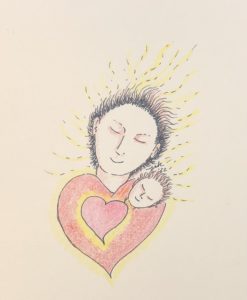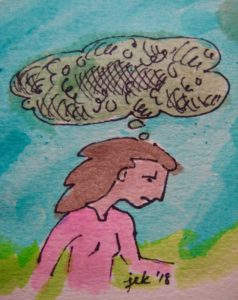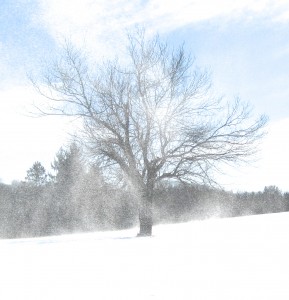
– Artwork © 2022 Jan Ketchel
As infants, we are primed to be fallen in love with. The attention we receive fills us with the validation that we are, indeed, wanted, worthy beings. The glitter in the eye, the awe, the patient being caring for us, the play which engages us where we are, all fill us with the love, joy, and excitement needed to feel ourselves to be welcomed participants with a definite home in this world.
If you are in this world, you were once touched by that love, however fleetingly or scantily it was offered. For to be completely unmet turns off the ability to attach and survive, much less thrive. Nonetheless, in truth, the depth of this primal need for love is rarely fulfilled in childhood, with the result that some of the switches that would turn on the energy for a fully engaged life await turning on later in life.
Children often discover on their own what can bring them the loving attention they seek. I discovered that my mother loved a clean, shiny bathroom. I would spend a good deal of time polishing every surface, using a towel to shine the handles on the sink and tub to receive my mother’s glowing looks and soft, loving words of appreciation. Similarly, I would scrub my grandmother’s tiled kitchen floor on hands and knees, again polishing with a towel, just to receive her loving smile of appreciation.
Not feeling worthy because one simply exists, turns human beings into human doings. Codependency is a life of doing to receive love. Relationships often fall into this pattern of constantly needing to please the other in order to receive the coveted gold of attention. The compulsivity of this relational pattern is driven by the underlying fixed belief of unworthiness, where one remains unconvinced of one’s intrinsic worthiness, regardless of the amount of attention one receives. Hence, the constant need to fill one’s enduring sense of inner emptiness through service to sources outside of the self.
Consequently, love, however genuinely offered by another, will never convince one who feels inwardly unworthy, at their core, of their worthiness. Once the critical period of childhood has passed, turning on the switches to a fulfilling life becomes an inside job. This is the path of self love. The adult self you have become must assume responsibility for truly loving the neglected child you bear within.
Frequently, this involves addressing the resentment and entitlement that defensively shroud the vulnerable child within, protecting it from anticipated shameful and painful encounters with a failure to be loved. This creates enormous blockages of energy within the self that stagnate rather than engage in a love affair with life. These pooled energies can actually manifest as physical diseases, where the body draws attention to these energy blockages.
Often this dis-ease is the refusal to forgive. Forgiveness requires the action of giving. Giving is releasing something you hold onto. If someone hurt you and you hold resentment, your energy becomes blocked. In forgiving, you give away your attachment to being offended. In giving it away, you redeploy your energy reserves to flow toward life rather than stagnate in defense.
Nothing can erase the truth of neglect or abuse. However, once it has occurred it takes up residence within the self. It becomes the property of the self. All of my life experiences, good or bad, are part of who I am. The goal is to fully and harmoniously own all that I am, all I have experienced. To deny or remain stuck in blame alienates me from my wholeness.
It ultimately becomes one’s right and responsibility to address the fulness of one’s own life experiences. To do this, the adult self must become the ultimate parent, a parent that is charged with healing by forgiving the offenses of neglect and abuse accrued in one’s relationships through life.
Of course, we often forget, by suppressing or repressing, many unprocessed experiences of traumatic interactions. To initiate, as an adult, the intent to recapitulate one’s life, reverses the stagnant action of forgetting. Instead, we open to the action for getting to all the hidden experiences previously frozen in time in the storage container of the physical body.
In so doing, we are able to free ourselves of extraneous energy, i.e., the negative beliefs of others, that we have previously held within us. We also master the emotions and sensations pooled within, freeing that energy to be redeployed into a fulfilling life.
These are the actions of primal love that free the innocent child self to experience the joy and awe of life. From this place of openness, one is also ready to truly open to fulfilling relationships.
Beneath the surface is now a worthy child in partnership with a loving parent, ready to open to true connection in relationship, and in all of life as well.
Polishing my intent to love,
Chuck



